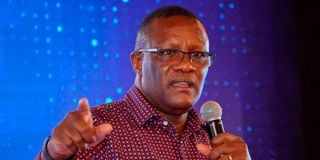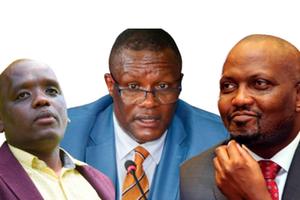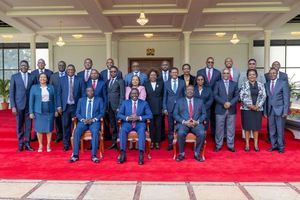
Former Cabinet Secretary for Information, Communication and the Digital Economy, Eliud Owalo.
Former Information, Communication and the Digital Economy Cabinet Secretary Eliud Owalo – who was among 12 Cabinet Secretaries dropped by President William Ruto following the nationwide anti-government protests – has for the first time spoken about the unprecedented dissolution of the Cabinet.
Mr Owalo, who did not make a comeback into the reconstituted Cabinet that co-opted five opposition politicians fronted by ODM leader Raila Odinga, appeared to suggest that he was one of the casualties of communication deficit on government programs and projects.
In an exclusive interview with Nation.Africa, Mr Owalo disclosed how the youth-led siege jolted President Ruto’s administration to re-organise the Performance and Delivery Management unit by moving it to the Executive Office of the President for effective supervision of Kenya Kwanza priority projects.
Apart from Mr Owalo, President Ruto also dropped Prof Njuguna Ndung’u (National Treasury), Ababu Namwamba (Sports and Youth Affairs), Florence Bore (Labour and Social Protection), Simon Chelugui (Co-operatives) and Moses Kuria (Public Service, Performance and Delivery).
Similarly, Aisha Jumwa (Gender, Culture, Arts and Heritage), Susan Nakhumicha (Health), Ezekiel Machogu (Education), Mithika Linturi (Agriculture), Peninah Malonza (EAC, ASAL) and Zacharia Njeru (Water, Sanitation and Irrigation) were also dropped.
However, Mr Owalo got a soft landing in August when President Ruto appointed him the Deputy Chief of Staff for Performance and Delivery management, a position many saw as demotion.
Here are the excepts of the interview:
Q: How did you feel when you were dropped from the Cabinet?
You should have started by asking me how I felt when President Ruto appointed me to his Cabinet out of his own volition in the first place. It is the prerogative of the President to constitute and re-constitute his Cabinet.

President William Ruto (left) presents a copy of the Ministerial Performance Contracts for FY 2023/2024 to then Cabinet Secretary for Information, Communications and Digital Economy Eliud Owalo at State House, Nairobi on August 1, 2023.
He deemed it appropriate to appoint me in his first Cabinet and I owe him a great debt of gratitude for that. You also need to understand that we operate in a dynamic as opposed to static environment where factors in play are never held constant.
Any student of strategy will re-align to environmental manifestations, and that could have informed the decision to reconstitute the Cabinet so I have no qualms with it as it is solely the discretion of the President.
Q: Did the President prepare you for the sacking, was there a Cabinet meeting?
Cabinet proceedings, discussions and resolutions are strictly for the Cabinet. Any information that needs to be communicated to the public is usually released through the official channels.
Q: What was it like before the reconstitution of the Cabinet; were there lobbying, meetings?
I’m not privy to any such meetings and for the record, there was none to the best of my knowledge. If you continue lamenting during troughs, you are likely to get stuck and run the risk of wallowing in that quagmire forever. I’m more inclined to the positivity school of thought.
Q: Do you see your new role as Deputy Chief of Staff for Performance as a demotion?
I approach the work I do, in every role, with the lens of service to the people. I discussed this role in detail with the President before taking it up. I’m a principled person and if I was not happy with the position I would not have taken it up in the first place, so I was at peace with my conscience.
I think Kenyans are over pre-occupied with positions, the pecking order and personal aggrandizement as opposed to the much-needed service delivery to the people. Egocentric interests and personal aggrandizement is not what drives me.
Let me make it clear that if I was driven by personal interests, I would have remained in the private sector as a consultant where I was much better off.
But a time comes when one needs to utilize the knowledge, skills and competencies in their possession for the direct good of the larger public, and that time was opportune for me.
Q: How are you settling into your new office?
I don’t believe in the concept of settling down because it comes at a heavy opportunity cost in terms of time implications. I believe people should take up jobs and responsibilities in tandem with their skills, competencies and capabilities so that as they get into any new office, they embark on work immediately.
Q: Is this a new office, and what exactly are your roles?
The position of Deputy Chief of Staff responsible for Performance and Delivery Management in the Executive Office of the President is a new one. But functionally, the two roles have hitherto existed though domiciled in different line ministries and departments.
The Performance Management function has historically been domiciled in the Ministry of Public Service while the Delivery function under the 5th Administration was initially under the Office of the Prime Cabinet Secretary before being transferred to the Ministry of Public Service. It was deemed imperative to bring both under the Executive Office of the President to give both functions more teeth to deliver on their respective mandates.
My role within the Performance Management function entails Developing and Institutionalizing the Performance Management framework in the highest echelons of the Government, specifically at the level of Cabinet Secretaries, Principal Secretaries and CEO’s of Parastatals.
I have already embarked on this in earnest by negotiating, validating and ratifying Performance Contracts with all the Cabinet Secretaries plus the Attorney General.
This culminated into the Performance Contracts that the President signed with the Cabinet Secretaries and the Attorney General on 19th November 2024. We are now progressing to have the Performance Contracts cascaded downwards at all levels within the Ministries, Departments and Agencies and further to the individual scorecards.
Subsequently, we will utilise the same commitments, expected outputs, output indicators and time-bound targets in the Performance Contracts to inform the formal Performance Appraisal/Evaluation as at 30th June 2025.
The domain of Delivery Management is informed by the need for effective and efficient delivery of Government Projects and Programmes. This entails monitoring, evaluating and reporting on the implementation status of the projects and programmes; intervening where there are challenges; engaging stakeholders to keep them abreast with the implementation status; and ensuring effective communication on the same.
Recently, my office has been assigned two additional roles, of overseeing implementation of all the President’s Priority initiatives’ plus Public Sector Reforms and Re-engineering.
Q: What is the government doing differently since the Gen Z protests, in terms of communicating its priority projects?
It is true that we have had a communication deficit in the past. We have now enhanced coordination between the Government Delivery Unit and Line Ministries plus implementing Agencies to have real time information on the implementation status of all Government projects.
Moving forward, we want to engage all stakeholders on the implementation status of all government projects in an open manner, while also being receptive to constructive criticism should it be the case.
It should not be misconstrued as a case of the government versus the people, but everyone working together with the government to ensure effective, efficient and seamless implementation of projects and programmes for the good of all Kenyans.
Q: You have been at the centre of the recent performance contracting; are CSs still signing the contracts as a matter of routine?
Moving forward, Performance Management will be institutionalized in the entire Public Service, and both Performance Contracting and Performance Appraisal will be anchored in Law. We already have a draft Performance Management Bill that will facilitate institutionalisation of the entire Performance Management Framework. The net effect is that everybody in the Public Service will be held accountable for results, and the results of Performance Evaluation plus the attendant recommendations will be legally enforceable.
Q: What are the consequences for poor performance for public officers?
We will tie the annual Performance Evaluation/Appraisal to Reward Management. This implies that Ministries, Departments and Agencies which exhibit exemplary performance will be rewarded to a level commensurate with their performance.
Conversely, perpetual non-performers will face corrective action, including sanctions in equal measure. This will also apply to individuals at all levels within the MDAs, from the top upto the individual scorecard.
Q: What would you consider as your key achievements in the ICT ministry?
The most fundamental milestone realised to me was the declaration by the EACC that the Ministry of Information, Communications and the Digital Economy under my leadership was the least corrupt. Other remarkable achievements were digitalization of 17,668 services within the first one and a half years against a 5-year target of 5000 services; establishment of 274 digital hubs spread evenly in different parts of the country; Training of 516,505 youth on digital skills;152,711 digital jobs created for the youth;1,360 Wi-Fi Hotspots established across all the 47 counties; Local assembly of 1.5 Million affordable Smart -Enabled phones retailing at about Sh7,500 out of which 579,000 had been sold out; establishment and operationalization of the Open University of Kenya to facilitate virtual learning and universal access to education; Roll out of 10,219 Km of Fibre Optic Cable and Re-engineering the model to utilize KPLC electricity transmission lines to roll out the Fibre as opposed to underground digging; initiation of the process of Re-engineering of the Postal Corporation of Kenya into an E-Commerce and Logistics Hub; initiating ICT Sector-Wide Reforms; and initiating the process of developing the National Communication Strategy.My exemplary performance at the Ministry led to my being nominated as Africa’s Digital Economy Awards (ADEA) Personality of the Year 2023.
Q: What is your view of the broad-based government that saw opposition leaders join the Cabinet?
As already indicated, the constitution of the Cabinet is the prerogative and purview of the President. Once he exercises this constitutional mandate, all of us in the Public Service work with the team in place, and that’s exactly what we are doing in a harmonious and seamless manner.








